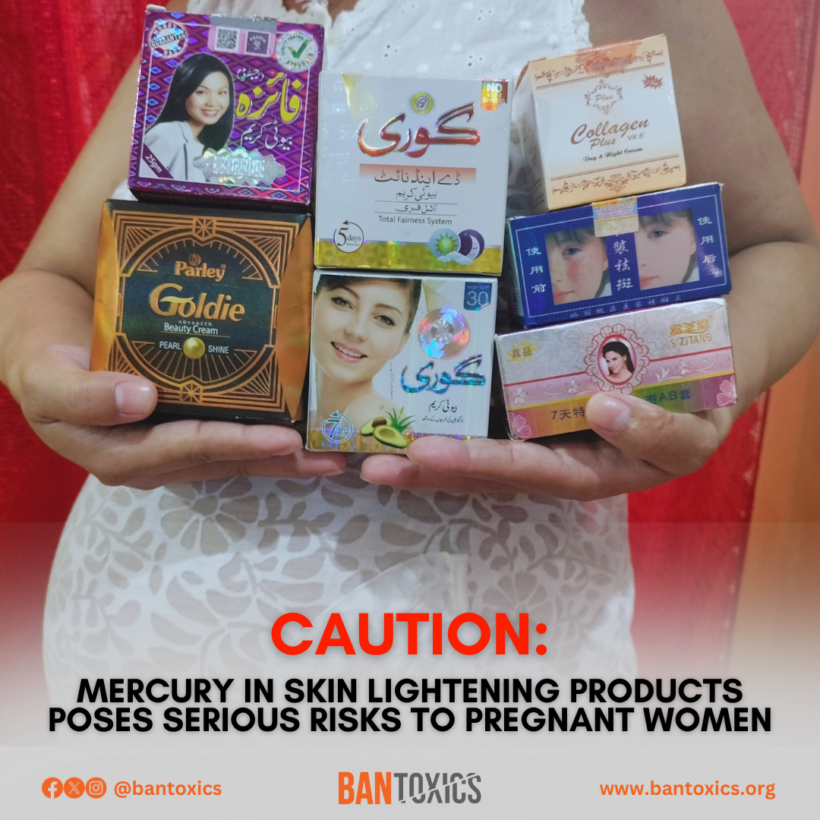Amidst the bustling holiday shopping season, BAN Toxics issues a cautionary advisory against the purchase and usage of skin-lightening products containing toxic chemicals, readily available in local markets and online platforms. The toxic watchdog expresses grave concern over the proliferation and ‘bargain’ sales of these hazardous beauty products due to their profound adverse health and safety effects, particularly among pregnant women.
Despite being banned in the country and worldwide, mercury-containing whitening products are easily available for sale over the internet, promoted online on social media sites, and sold through mobile apps and local markets. Lightening products that do not contain mercury may contain other hazardous substances, such as hydroquinone, found in over-the-counter products used to correct skin discoloration.
Since 2017, the European Environmental Bureau (EEB), in collaboration with the Zero Mercury Waste Working Group (ZMWWG) and BAN Toxics, has gathered and analyzed data from testing and official sources. The findings underscore the alarming absence of effective controls, allowing the unhindered production and online sale of mercury-laden skin-lightening products.
In its October 2023 report, 213 skin-lightening products (SLPs) were acquired from 23 online platforms across 12 countries, including the Philippines. Alarmingly, 191 of these products (90%) surpassed the 1 ppm limit mandated by governments and the Minamata Convention, with mercury concentrations ranging from 1.18 to 74,800.00 ppm.
Ongoing online market surveillance of BAN Toxics likewise reveals a persistent presence of products containing mercury, a known hazard to human health. Recently, rebranded Pakistan-made Goree Gold Beauty Cream 24K products have surfaced in local beauty shops. Those identical products are also sold at discounted prices on shopping platforms like Shopee and Lazada, priced between P150 and P350 each.
“Government should put an end to the illegal trade of mercury-added skin-lightening cosmetics in both online and on-site markets. BAN Toxics urged the regulatory agencies to crack down on smugglers of these prohibited products,” said Thony Dizon, Toxics Campaigner of BAN Toxics.
The growing popularity of the skin whitening industry in the country is unfortunately increasing the exposure of pregnant and non-pregnant women to the most common environmental pollutants and endocrine-disrupting chemicals associated with various health impacts.
“The existing health and e-commerce regulations in the country should prevent online shopping platforms from continuous marketing of banned and prohibited whitening products. We have to safeguard the safety of the consumers, especially pregnant women, against toxic mercury exposure,” Dizon added.
Adverse health effects of the use of mercury and hazardous substances in cosmetics include kidney damage, skin rashes, skin discoloration and scarring, reduction in the skin’s resistance to bacterial and fungal infections, anxiety, depression, psychosis, and peripheral neuropathy, according to the World Health Organization (WHO).
The exposure of expecting mothers to harmful toxic substances is particularly worrisome due to the potential transfer of these chemicals from the mother to the fetus through both the placenta and breast milk. Such exposure during fetal development and infancy could lead to lasting health risks.
“BAN Toxics reiterates its appeal to regulators to take action against the unethical and illegal promotion and sale of skin whitening cosmetics with undisclosed mercury content on online shopping and social media platforms,” the group added.
Online businesses must adhere to the country’s laws and regulations, including safeguarding online consumers against health and safety risks, as outlined in Joint Administrative Order (JAO) No. 22-01 Series of 2022.
This order, established by the Department of Trade and Industry (DTI), Department of Agriculture (DA), Department of Health (DOH), Department of Environment and Natural Resources (DENR), Intellectual Property Office of the Philippines, and the National Privacy Commission, provides guidelines for online businesses to follow.
To protect the public from the negative effects of hazardous chemicals in skin-lightening products, it is high time for the government to implement robust compliance and enforcement strategies, including identifying importers, manufacturers, and other supply chains, particularly within e-commerce sites. Health agencies should conduct public awareness campaigns and national advocacy to inform consumers about the health risks of skin-lightening products.
References:
Online Marketing of Toxic Skin Lighteners: Mercury cosmetics marketed as a ‘solution’ to dark skin (October 2023)
https://www.zeromercury.org/wp-content/uploads/2023/10/ZMWG-SLP-Oct-2023-Full-Report.pdf
https://iris.who.int/bitstream/handle/10665/330015/WHO-CED-PHE-EPE-19.13-eng.pdf?sequence=1






